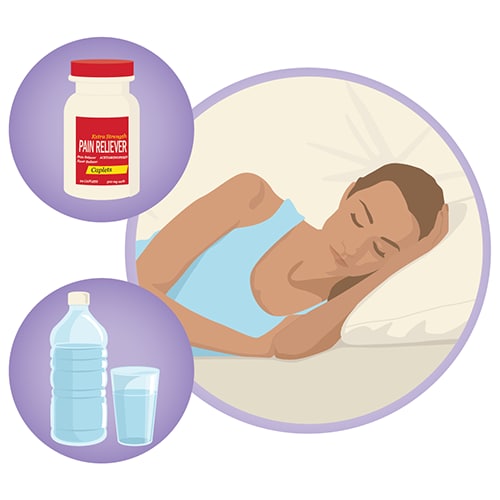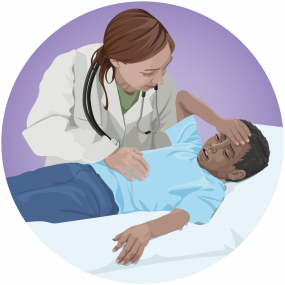Caring for a Child or Family Member Sick with Dengue
There is no medicine to treat dengue. Symptoms of dengue can be mild or severe. Mild symptoms can be treated at home.
Treat Mild Symptoms at Home

- Rest as much as possible
- Control fever
- Give acetaminophen (also known as paracetamol) to control fever and relieve pain. Always follow product label instructions. Do not give ibuprofen, aspirin, or aspirin-containing drugs.
- Sponge the person’s skin with cool water to reduce fever.
- Prevent dehydration – Dehydration occurs when a person loses too much body fluid from fever, vomiting, or not drinking enough liquids.
Signs of mild to moderate dehydration
| Babies and Children | Adults |
|---|---|
| Sleepiness, lack of energy, very fussy | Not peeing very much, dark yellow pee |
| Sunken eyes | Feeling dizzy, sleepy, no energy, confused, or irritable |
| Cool, discolored hands or feet | Rapid heart rate, breathing |
| Urinates 1-2 times per day | Sunken eyes |
| What to do: Talk to your healthcare provider. Provide fluids such a water, juice, milk, or drinks with added electrolytes. | |
Signs of severe dehydration
| Babies and Children | Adults |
|---|---|
| Urinates less frequently (less than 6 wet diapers per day) | Thirst, dry or sticky mouth |
| Dry mouth, tongue, lips | Not peeing very much, dark yellow pee |
| Few or no tears when crying | Dry, cool skin |
| Sunken soft spot of the head | Headache |
| What to do: Go to an urgent care clinic or the emergency room immediately. | |
As Fever Goes Away
Watch for warning signs
Although the fever has gone away, the next phase of dengue can be dangerous for some people. Warning signs generally begin in the 24-48 hours after the fever has gone away.
About 1 in 20 people with dengue will develop severe dengue. Severe dengue requires hospitalization and can be life threatening.

If you or a family member develop any of the following warning signs, go to an urgent care clinic or the emergency room immediately:
- Stomach or belly pain, tenderness
- Vomiting (at least 3 times in 24 hours)
- Bleeding from the nose or gums
- Vomiting blood, or blood in the stool
- Feeling tired, restless, or irritable
- Cold clammy skin
- Difficulty breathing
Severe dengue is a medical emergency and requires immediate medical attention or hospitalization.
If You Have Dengue, Protect Others
During the first week of infection, dengue virus is found in the blood of an infected person. If a mosquito bites an infected person, the mosquito becomes infected. The infected mosquito can spread the virus to other people through bites. Avoid mosquito bites indoors to keep family from getting dengue.
- Wear long-sleeved shirts and long pants.
- Keep mosquitoes outside: Use screens on windows and doors.
- Use air conditioning if available.
- Use Environmental Protection Agency (EPA)-registered insect repellent.
Use Environmental Protection Agency (EPA)-registered insect repellents with one of the active ingredients below. Higher percentages of active ingredient provide longer protection. When used as directed, EPA-registered insect repellents are proven safe and effective, even for pregnant and breastfeeding women.
- DEET
- Picaridin (known as KBR 3023 and icaridin outside the US)
- IR3535
- Oil of lemon eucalyptus (OLE)
- Para-menthane-diol (PMD)
- 2-undecanone
Find the right insect repellent for you by using EPA’s search tool.
No comments:
Post a Comment